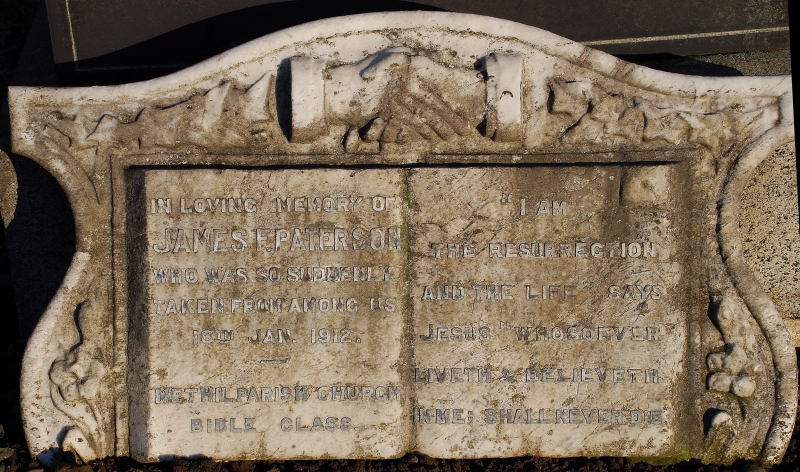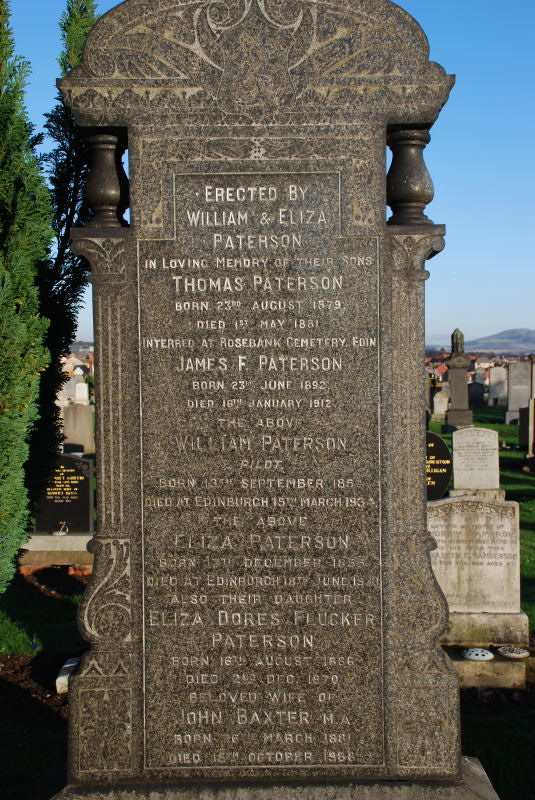Methil Youth Drowned
Report in the Scotsman dated Thursday 18th January 1912
"On hearing a cry that a ship was into the back of the pier, George (the Scotsman got the name wrong, it should have been James F.) Paterson, son of Mr. W. Paterson, Methil, proceeded towards the spot. In the darkness he lost his way, and fell into the new dock basin. Some people heard the splash and his cries. Mr. Paterson was among those who were attracted to the spot, but they were powerless to help the lad, who sank before a rope could be secured. He was twenty years of age. The body was recovered yesterday morning."
Funeral of James F. Paterson
Report in the Leven Advertiser and Wemyss Gazette – January 1912
“Amid many signs of public sympathy, the remains of James F. Paterson, who lost his life last week under singularly sad circumstances, were laid to rest on Saturday in Methilmill Cemetery.
The tragic termination of a life on the threshold of manhood while in the full vigour of health, touch the heart of the community and evoked widespread sorrow for the stricken home. This feeling won expression in one of the largest funeral processions that has been witnessed in Methil. The number of young men among the mourners was a striking picture in the moving scene, and was a testimony to the respect and esteem in which the deceased was held by a wide circle of the youth of the district.
As the cortege wound its way to the place of interment, sympathetic crowds lined the streets, while blinds were drawn in the houses on the route of the funeral. Representatives from the Anchor of Hope Tent of the Rechabites in regalia marched at each side of the hearse. At the cemetery gate the oak coffin, with heavy brass mountings, was removed from the hearse and carried shoulder high to the grave by the deceased’s fellow workmen at Durie Foundry.
The Rev Alexander Robertson [Minister at Methil Parish Church] conducted a service at Trinity Cottage and also at the graveside. The pall-bearers were:- Mr. William Paterson (father), Mr. James Ballingall, Manchester, (brother-in-law), Mr. John Baxter, Cowdenbeath (brother-in-law), Mr. Thomas Paterson, Newhaven (uncle), Mr. Robert Flucker, Newhaven (uncle) and Mr. W. Combe, Newhaven (uncle).
There was placed on the grave a marble scroll and dove from his fellow workers in Durie Foundry, an anchor wreath from the members of Leven Swimming Club, a wreath on marble stand from Brother Rechabites and also a wreath from his chums, all enclosed in glass globes. The floral tributes were very numerous, and bore messages of love and sympathy.
Suitable reference was made on Sunday to the distressing affair from the various pulpits in the town and district.
Mr. Robert Galloway carried through the funeral arrangements.”
Marker presented by Methil Parish Church and Family headstone in Methilmill cemetery
Notes:
The Independent Order of Rechabites is a friendly society founded in England in 1835 as part of the temperance movement to promote total abstinence from alcoholic beverages. It gradually transformed into a financial institution while still promoting total abstinence. Named after the nomadic abstaining Rechabites of the Old Testament they established halls, normally called Tents, where the working class people could pay their dues to the Society.

